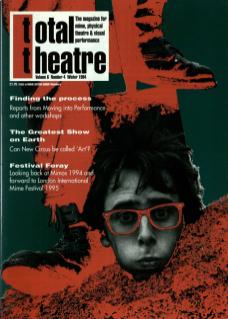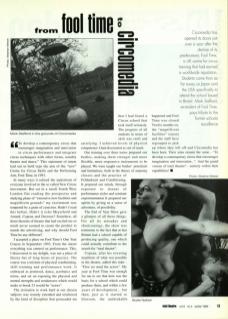‘To develop a contemporary circus that encourages imagination and innovation in circus performance and integrate circus techniques with other forms, notably theatre and dance.’ This statement of intent laid out in bold type was the aim of the ‘new’ Centre for Circus Skills and the Performing Arts, Fool Time, in 1993.
In many ways it echoed the aspirations of everyone involved in the so-called New Circus movement. But sat in a small South West London flat reading the prospectus and studying plans of ‘extensive new facilities and magnificent grounds’ my excitement was tempered by a grain of cynicism. Hadn't I read this before. Didn't it echo Meyerhold and Artaud, Copeau and Decroux? Somehow, all those theories of theatre that had excited me so much never seemed to create the product to match the advertising, and why should Fool Time be any different?
I accepted a place on Fool Time's One Year Course in September 1993. From the outset everything was centred on performance. This, I discovered to my delight, was not a place of theory but of long hours of practice. The course was a mixture of physical conditioning, skill training and performance work. It embraced, as promised, dance, acrobatics and mime, and set on exposing the physical and mental strengths and weaknesses which would make or break 23 would-be ‘actors’.
The invitation to work hard at our chosen subjects was warmly extended and reinforced by the kind of discipline that persuaded me that I had found a Circus school that took itself seriously. The progress of all students in terms of skill was swift and satisfying. I achieved levels of physical competence I had discounted as out of reach.
Our training over three terms prepared our bodies, making them stronger and more flexible, more responsive instruments to be played. We were taught our bodies' potentials and limitations, both in the theory of anatomy classes and the practice of Feldenkrais and Conditioning. It prepared our minds, through exposure to dozens of performance styles and constant experimentation. It prepared our spirits by giving us a sense of adventure, of possibility.
The End of Year Show gave a glimpse of all these things. For all its mistakes and shortcomings, the show was testimony to the fact that at last Britain had a school capable of producing quality, one which could actually contribute to the search for ‘total theatre’.
Copeau, after his towering manifesto of what was possible in the theatre, added this rider – ‘First we need the actors’. My year at Fool Time was enough for me to see that here was the basis for a school which could produce them, and within a few years of development... but then, just as it started to blossom, the unthinkable happened and Fool Time was closed. Twelve months on, the ‘magnificent facilities’ remain and the staff have regrouped to pick up where they left off and Circomedia has been born. Their aims remain the same – ‘To develop a contemporary circus that encourages imagination and innovation...’. And the grand visions of total theatre? – entirely within their capabilities!

